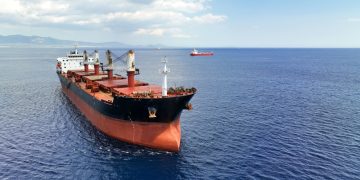The Clean Maritime Fuels Platform, representing European shipowners and fuel suppliers, emphasized the urgent need to develop a European supply chain for clean shipping fuels. In a joint statement, they urged the European Commission to include renewable fuels in the upcoming Clean Industrial Deal and to strengthen Europe’s leadership in green maritime fuels,
The Clean Maritime Fuels Platform highlights that building a supply chain for renewable and low-carbon fuels in Europe is a priority to ensure shipping meets its decarbonisation targets and Europe achieves its climate objectives. The Draghi report on the “Future of European Competitiveness” identifies shipping as one of the most difficult sectors to decarbonise, requiring around 40 billion in annual investments between 2031 and 2050. A robust European industrial base for clean maritime fuels is essential to meet climate goals and secure Europe’s leadership in green innovation. However, renewable and low-carbon fuels projects face significant uncertainties that deter public and private investment.
Furthermore, these include technological risks and high upfront capital requirements that disadvantage first movers. Additional obstacles include the high production costs of renewable and low-carbon fuels and a mismatch of business models between producers, who seek long-term contracts at high prices, and users, for whom shorter-term commitments for smaller fuel volumes bear less risk.
These factors create high financial risks and uncertainty that may be insurmountable without more tailored public support than what the current EU Hydrogen Bank and ETS Innovation Fund schemes provide.
Making clean fuels available is a prerequisite for the energy transition of shipping. The Clean Industrial Deal is a great opportunity to set the conditions to upscale the manufacturing of clean fuels for shipping.
…said Sotiris Raptis, Secretary General, ECSA.
In addition, Raptis continued by highlighting that unlocking public and private investments through the use of EU and national ETS revenues is vital to bridge the immense price gap between clean and conventional fuels
“Shipping is the backbone of Europe’s external trade and a key contributor to the EU’s economy. Its decarbonisation must go hand in hand with industrial competitiveness. To accelerate the transition, we need to turn clean maritime fuels from an ambition into a reality. Europe has the opportunity to lead the way in clean shipping, but we must act now” pointed out Liana Gouta, Director General, FuelsEurope.
To address these challenges, the Clean Maritime Fuels Platform urge the European Commission to:
- Include renewable and low-carbon fuels and innovative technologies needed by shipping, one of the most difficult-to-decarbonise sectors of the economy, in the scope of the upcoming Clean Industrial Deal.
- Harness the Sustainable Transport Investment Plan (STIP) in line with the Competitiveness Compass, to de-risk investments needed to swiftly ramp up the production and distribution of renewable and low-carbon fuels for shipping. The objective should be to create a European manufacturing capacity capable to match the EU demand for clean shipping fuels in Europe as much as possible, in line with the benchmark of the NetZero Industry Act and the targets of the FuelEU Maritime.
- Establish a European industrial base for renewable and low-carbon shipping fuels by de-risking projects through public financial support from the EU and national ETS revenues, as well as revenue certainty mechanisms, such as contracts for difference. This should especially address the uncertainty arising from the high production costs of renewable and low-carbon fuels, long-term offtake commitments required, and market volatility, which are currently hindering projects in Europe from delivering large volumes of renewable and low-carbon fuels.
- Facilitate the role of ports as energy hubs through scalable renewable and low-carbon fuels infrastructure mandates and fostering international cooperation among ports.
Key challenges, including high production costs, technological risks, and insufficient market incentives for sustainable fuels, are crucial. To overcome these barriers, clear regulatory commitments and dedicated support mechanisms are essential to foster investment in the industrial-scale production of renewable marine fuels. The proposed measures allow Europe to establish itself as a global leader in the decarbonization of the shipping industry, stated Ralf Diemer, CEO of the eFuel Alliance.
The energy transition of the maritime sector is vital to Europe’s climate goals and industrial leadership. The statement underscores the fact that European shipping is a strategic sector for Europe, carrying the “lion’s share” of the EU’s external trade moving around 76% of the EU’s external trade and ensuring security of supply of energy, food and goods.
“The EU has the opportunity to lead the global clean maritime transition by developing a comprehensive and sustainable industrial strategy. Promoting renewable fuels, including waste-based and advanced biodiesel, will be key to strengthening competitiveness and accelerating the shift toward greener shipping” also stressed Angel Alvarez Alberdi, Secretary General, EWABA.
Access to clean maritime fuels is critical for decarbonising the shipping sector and meeting Europe’s climate targets. With €40 billion in annual investments needed, we urge the European Commission to include renewable fuels in the upcoming Clean Industrial Deal and secure Europe’s leadership in green maritime fuels
..said Daniel Fraile, Chief Policy Officer, Hydrogen Europe.
Tim Eestermans, Managing Director Europe of the Methanol Institute, pointed out among other things, that building a reliable supply chain for renewable and low-carbon fuels isn’t just about cutting emissions, it’s about securing Europe’s industrial strength and creating new economic opportunities, and enhancing the EU’s global competitiveness as a hub for zero-near-zero GHG emission fuels production.
































































